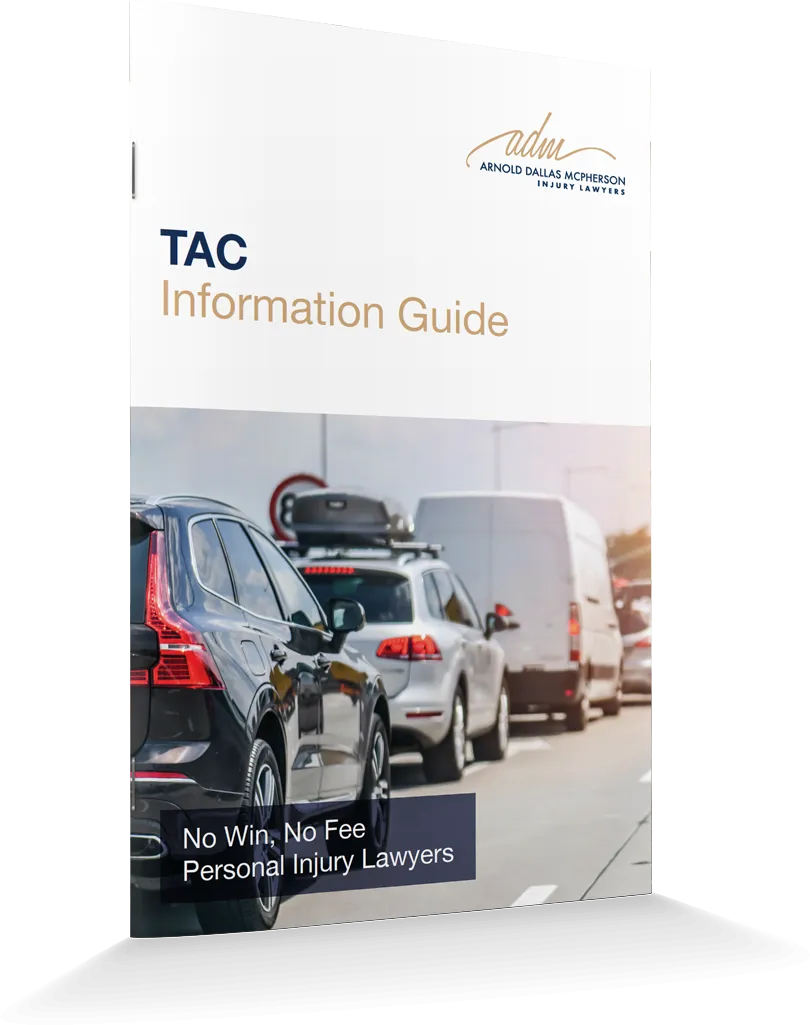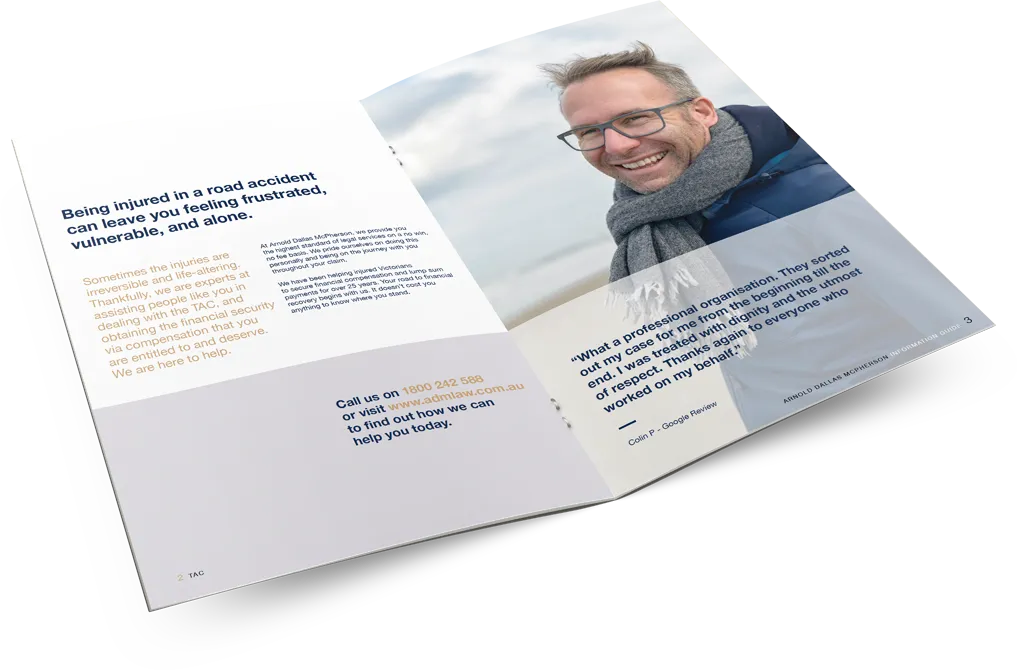Injuries in motor vehicle accidents can be life altering and traumatic. Contact us for help with your TAC Claim.

A car crash can leave you out of work, with injuries and struggling to get by. The expenses can pile up while you seek relief through insurance claims and the financial pressures can affect you for years after your accident.
Whether you have been injured in a road accident as a vehicle driver or passenger, a pedestrian, or a cyclist, or as someone who was severely affected mentally by a tragic accident, you could claim for compensation for your pain and suffering and lost earnings.
The TAC covers all types of motor vehicle accidents, and it does not even need to be someone else’s fault for you to have an entitlement to compensation.
We have a team of specialist TAC lawyers that will help you throughout your claim to obtain the maximum payout possible. We pride ourselves on being able to assist from start to finish in TAC claims.
Our solicitors have handled cases on behalf of clients who have sustained injuries ranging from minor lacerations and fractures, to debilitating disfigurement, internal organ damage and severe injuries. They know how to delicately handle cases involving fatal wrecks, pursuing compensation on behalf of the victim’s surviving family members.
Our team will work hard to maximise any lump-sum payouts.

"*" indicates required fields
If you have suffered an injury because of a transport accident in Victoria, you are able to lodge a claim with the Transport Accident Commission (TAC) for support and compensation.
A large part of the TAC scheme is ‘no-fault’. It provides benefits to people who have been injured in transport accident, regardless of how the accident occurred.
The benefits provided by the no fault part of the scheme fall into three different categories:
You can make a TAC claim if you’ve been injured in any type of transport accident. A transport accident is defined as an accident that has been caused by the driving of a car, motorcycle, bus, train or tram.
Injured persons can be drivers, passengers, pedestrians, cyclists and commuters.
To make your TAC claim, you need to;
Our Personal Injury Lawyers can also assist you with this process.
If you are claiming compensation for time off work, you will need to get a medical certificate from your doctor and proof of your earnings. You will then have to regularly send monthly medical certificates to the TAC for as long as you are unable to or restricted at work.
For those that are earners at the time of a transport accident, you can claim income replacement benefits.
Your first five days off work cannot be claimed from TAC. Most people use sick leave for this period, if they are entitled to this. After that, you can receive payment for time off work due to your injuries.
You may be an earner even if you were not working at the time of the accident, but had worked over the previous two years. You should seek legal advice as to whether you are an earner, if in any doubt.
If you are totally unable to work, you will be paid 80% of your pre-accident weekly earnings.
If you are suffering a partial loss of earnings, you should receive 85% of the difference between your pre-accident earnings and your current earnings.
If you are an earner still unable to work after 18 months, the TAC should continue to pay you but the amount will based on your loss of earning capacity, which may be different to your pre-injury earnings.
If you are not an earner but still cannot work 18 months after the accident, you may still be eligible for loss of earning capacity payments, but calculated under a different formula.
If you cannot work after three years, you will only receive loss of earnings payments from the TAC if;
Remember, you must keep lodging monthly medical certificates from your doctor with the TAC to continue to be paid.
The only other way to receive compensation for being unable to work is by making a Common Law (Fault) claim.
You can claim all reasonable medical expenses related to your injury. Medical services must be provided by a TAC accredited provider.
You can also claim for travel expenses when you see your own treating doctors and when you are sent to doctors by the TAC.
You may also claim for home help, help in the garden or for modifications to your home and car, where necessary. You should discuss these needs with your doctor, who can provide a letter to the TAC setting out your needs.
In the event that the TAC decide to reject any request for medical treatment or assistance, you should contact our lawyers regarding disputing the TAC’s decision as soon as possible.
If, after you recover as best you can from your injuries, you are assessed as having a more than a 10% permanent impairment as a result of your transport accident, you will receive lump sum compensation which we call an impairment benefit.
It does not matter how your accident occurred, and who or what was at fault for the accident.
The TAC will generally not assess you for this benefit before 18 months after your accident.
If the TAC assesses your impairment, you should consult us immediately to ensure this has been completed correctly.
However, the TAC do not usually go out of their way to have people assessed for Permanent Impairment. You ought to consult us as soon as possible to discuss your potential entitlements. Once you have stabilised from your transport accident injuries, you can commence your claim.
This assessment is also important in considering whether you have a serious injury or not.
A serious injury is required to sue any party that is at fault for your motor vehicle accident. The process of showing you have a serious injury begins with an assessment of your permanent impairment.
If your permanent impairment is 30% or more by law you have a serious injury automatically.
However, if your permanent impairment is less than 30%, and you want to claim common law damages, you will need to apply to the TAC for a serious injury certificate.
To prove serious injury, you must show you have a:
The first step is to lodge a serious injury application with the TAC. Our lawyers are experts in preparing these applications for the TAC to consider. This process usually takes around three months.
If, after consideration of your application, the TAC will not grant you a serious injury certificate, we can appeal this decision in the County Court.
A common law claim is a claim made when you can show that fault or “negligence” on the part of another driver or some other person has caused your injury.
This is a process where you sue the other person for causing injury to you.
However, most dealings in relation to motor vehicle accidents are ultimately dealt with by the TAC, rather than the individual at fault, as they insure drivers in Victoria for personal injury caused in a motor vehicle accident.
A successful common law claim results in a payment of a lump sum called “damages” to you by the TAC.
Your injury must be considered to qualify as a “serious injury” before you can claim common law damages.
Once you have proved your serious injury, we must negotiate with the TAC for the appropriate payment of damages to you. Such negotiations are often successful, however if negotiations fail, we will go to Court for you.
Damages have two components:
Once you receive a lump sum for lost wages, your weekly payments of compensation will stop.
If you receive a lump sum, whether for lost wages and/or pain and suffering, you are still entitled to payment of medical benefits. These are not affected by any compensation steps outlined above.
If a transport accident has contributed to the death of a person who was an earner, the dependents of the deceased person can claim benefits of up to $100,000.
Earner includes a person receiving Centrelink benefits for 26 weeks of the two years prior to the accident.
However, if death has been caused by negligence (fault) or another person, the dependants may sue for damages. You will need to see a one of our Personal Injury lawyers for advice in relation to this. Such claims can be complicated, due to having to compare “no fault” entitlements to fault based damages. Expert legal advice is required for such a decision.
If you are the parent of a child injured in an accident, the TAC will pay reasonable travel costs for you to visit your child in hospital and may pay for your reasonable accommodation costs.
If you are staying overnight at a hospital, the TAC may pay for your spouse and children to visit you. To qualify, they must live more than 100 kilometres from the hospital. If they do, the TAC will pay for their reasonable travel and accommodation costs.
Your rights to compensation may be affected by being reduced or not payable at all:
Similar provisions apply to driving whilst under the influence of drugs. Such provisions are complex, and often depend on the BAC of a person, or drug related offence they have been convicted of. You should ask one of our lawyers if you are concerned about this.
You have 12 months from the date of a decision of the TAC which you disagree with to lodge a dispute with the Victorian Civil and Administrative Tribunal (“VCAT”).
We can also assist you with objectionable TAC decisions by seeking internal review and/or by lodging a dispute through the TAC’s Dispute Resolution Protocols.
You only have 12 months to challenge a TAC decision. This period cannot be extended.
The TAC is required to help you design a rehabilitation and return to work plan, preferably with a rehabilitation provider. You must take all reasonable steps to participate in rehabilitation and return to work. If you do not, your benefits can be stopped.
Legal costs can be expensive, but we will do all we can to help. What we can do includes:
We will discuss costs in detail with you at our first interview. We will always answer your questions about costs. We will clearly advise you of the total costs when you come to settle your claim, and pride ourselves on being able to be clear as to what you will receive in hand, after payment of costs, before you settle your case.
A person can generally make a claim from the TAC if they are injured in a motor vehicle accident, due to the driving, or in certain circumstances, the use of, a motor vehicle. The definition of “motor vehicle” is quite broad, and can include a variety of transport, such as cars, trains, buses and even some industrial vehicles.
There are some exceptions to this, such as unregistered vehicles being driven off road, or lighter motorised transport such as mobility scooters, though advice should be sought from your solicitor at Arnold Dallas McPherson if any vehicle has been involved in your injury.
To lodge the claim, call the TAC on 1300 654 329 or do so online at www.tac.vic.gov.au.
You have one year to lodge a TAC claim after your motor vehicle accident. There are certain circumstances in which this can be extended, however the safest course is to call the TAC and begin the claims process within one year of the date of your accident.
The circumstances in which this period can be extended are complicated and if you are beyond the one-year period, you should contact us as soon as possible for advice.
Loss of Earnings/Income replacement
After the first five working days after injury the TAC can pay loss of earnings benefits to a person who suffers a loss of income because of their injuries.
Loss of earnings benefits are payable at a rate of 80% of your ‘pre-accident weekly earnings’ (up to a statutory maximum) for a period of 18 months after the accident.
If you are still incapacitated for work after 18 months, the TAC can pay loss of earning capacity benefits for a further 18 months. Loss of earning capacity benefits can be payable even if you were not working at the time of the accident.
Loss of earning capacity benefits are only potentially payable after the 3rd anniversary of your accident if you have a whole person impairment of 50% or more.
Medical and Like Expenses
The TAC is able to pay for reasonable medical and related expenses for treatment required for your accident-caused injuries.
This can include medication, rehabilitation, travel expenses or even help in your home or garden.
If a family member has been hospitalised after an accident and you live far from the hospital, certain family members are able to claim for assistance with accommodation and travel costs and, in limited circumstances, lost earnings, to visit the family member.
Lump Sum Compensation and Damages (Impairment benefit)
If you have a permanent injury as a result of the accident, you may be entitled to a modest lump sum payment known as an impairment benefit.
You can receive an impairment benefit if your whole person impairment score is independently assessed as greater than 10% under prescribed impairment guides.
Your level of impairment can generally not be assessed until at least 12 months after your accident. An impairment benefit claim must be made within 6 years from the date of the accident.
If you have a long term injury you may have a Permanent Impairment. What level of Impairment you have directly correlates to how much compensation you are entitled to.
Firstly, you must wait at least 12 months after your injury to see what Impairment you may have. This is to allow you to stabilise from your injuries.
Once you have stabilised from your injuries, your lawyer at Arnold Dallas McPherson in concert with the TAC will arrange for assessment of your Impairment in accordance with specific Guidelines.
Arnold Dallas McPherson are experts in advising as to appropriate Impairment ratings taking into account the symptoms and treatment a client has had and how the Guidelines relate to them. We strongly recommend you seek advice of experts in this area when pursuing an Impairment Claim.
If you have a “serious injury” If you have suffered injury due to the negligence of another person, you may be able to sue for further compensation in addition to your no fault benefits, known as common law damages.
However, a person can only sue for damages if they have a “serious injury” certificate.
Damages at common law in TAC claims can compensate for your Pain and Suffering and your Economic Loss.
Serious Injury
You have a serious injury if:
• You are assessed as having an impairment of 30% or more; or
• The TAC or a Court grant you a serious injury certificate as you are considered to have:
(a) serious long-term impairment or loss of a body function; or
(b) permanent serious disfigurement; or
(c) severe long-term mental or behavioural disturbance or disorder; or
(d) loss of a foetus.
It is difficult to know exactly what a person is entitled to in terms of damages until their case has been explored thoroughly.
Arnold Dallas McPherson is comprised by experienced solicitors who understand how damages are calculated in any given circumstance and will be able to advise you as your case progresses. Many of the solicitors at Arnold Dallas McPherson are Personal Injury Specialists, accredited by the Law Institute of Victoria.
Pain and suffering damages are calculated based upon the effects of your injuries on you as an individual. They depend on how any given injury, or injuries, affect your day-to-day life, home duties, hobbies, recreational activities, pain levels, sleep, mood and various other facets of your life.
How the injury affects you is the key factor.
Loss of income damages can be for your past loss of earnings and also sometimes for your future loss of earning capacity. This can be a wide ranging calculation depending on your age, education, skills, training and experience in the workforce, when looked at in the context of your injuries suffered and your resultant disability.
It will depend significantly on your personal circumstances as to what you might be entitled to.
Again, how the injury affects you is the key factor in this calculation.
You have 12 months from the date of a decision of the TAC which you disagree with to lodge a dispute with the Victorian Civil and Administrative Tribunal (“VCAT”).
We can also assist you with objectionable TAC decisions by seeking internal review and/or by lodging a dispute through the TAC’s Dispute Resolution Protocols.
Even what you might consider relatively minor issues should be queried with your solicitor at Arnold Dallas McPherson as early as possible so as to ensure your rights are protected.

"*" indicates required fields

"*" indicates required fields
Our TAC Accident Injury Lawyers are here and ready to answer any of your questions.
"*" indicates required fields

Leave a message for Seth and he will aim to respond back to you within 24 hours.

Leave a message for Christopher and he will aim to respond back to you within 24 hours.